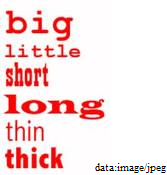Rules
Example
|
|||
1.
Adjectives are invariable:
They do not change their form depending on the gender or number of the noun. |
|
||
2. To emphasise
or strengthen the meaning of an adjective use 'very' or 'really':
|
|
a)
Usually in front of a noun:
|
A beautiful girl.
|
b) After
verbs like "to be", "to seem" , "to look",
"to taste":
|
|
c) After
the noun: in some fixed expressions:
|
|
d) After
the noun with the adjectives involved, present, concerned:
|
|
Be
careful! When these adjectives are used
before the noun they have a different meaning:
- An involved discussion = detailed, complex
- A concerned father = worried, anxious
- The present situation = current, happening now
Function
|
Examples
|
Describe
feelings or qualities:
|
|
Give nationality
or origin:
|
|
Tell
more about a thing's characteristics:
|
|
Tell us
about age:
|
|
Tell us
about size and measurement:
|
|
Tell us
about colour:
|
|
Tell us
about material/what something is made of:
|
|
Tell us
about shape:
|
|
Express
a judgement or a value:
|
|
Order of Adjectives
Rules
Where a number of adjectives are used together, the order depends on the function of the adjective. The usual order is:Value/opinion, Size, Age/Temperature, Shape, Colour, Origin, Material
Value/opinion
|
delicious,
lovely, charming
|
Size
|
small,
huge, tiny
|
Age/Temperature
|
old, hot,
young
|
Shape
|
round,
square, rectangular
|
Colour
|
red,
blonde, black
|
Origin
|
Swedish,
Victorian, Chinese
|
Material
|
plastic,
wooden, silver
|
Examples:
- a lovely old red post-box
- some small round plastic tables
- some charming small silver ornaments
COMPARISON OF ADJECTIVES
COMPARISONS OF QUANTITY
To show difference: more, less, fewer + thanExamples:
With countable nouns: more / fewer- Eloise has more children than Chantal.
- Chantal has fewer children than Eloise.
- There are fewer dogs in Cardiff than in Bristol
- I have visited fewer countries than my friend has.
- He has read fewer books than she has.
- Eloise has more money than Chantal.
- Chantal has less money than Eloise.
- I spend less time on homework than you do.
- Cats drink less water than dogs.
- This new dictionary gives more information than the old one.
So, the rule is:
MORE + nouns that are countable or uncountable
FEWER + countable nouns
LESS + uncountable nouns
FEWER + countable nouns
LESS + uncountable nouns
To
show no difference: as much as , as many as, as few as, as little
as
- as many as / as few as + countable nouns
- as much as / as little as + uncountable nouns
Examples:
With countable nouns:
- They have as many children as us.
- We have as many customers as them.
- Tom has as few books as Jane.
- There are as few houses in his village as in mine.
- You know as many people as I do.
- I have visited the States as many times as he has.
With uncountable nouns:
- John eats as much food as Peter.
- Jim has as little food as Sam.
- You've heard as much news as I have.
- He's had as much success as his brother has.
- They've got as little water as we have.
www.edufind.com


Tidak ada komentar:
Posting Komentar